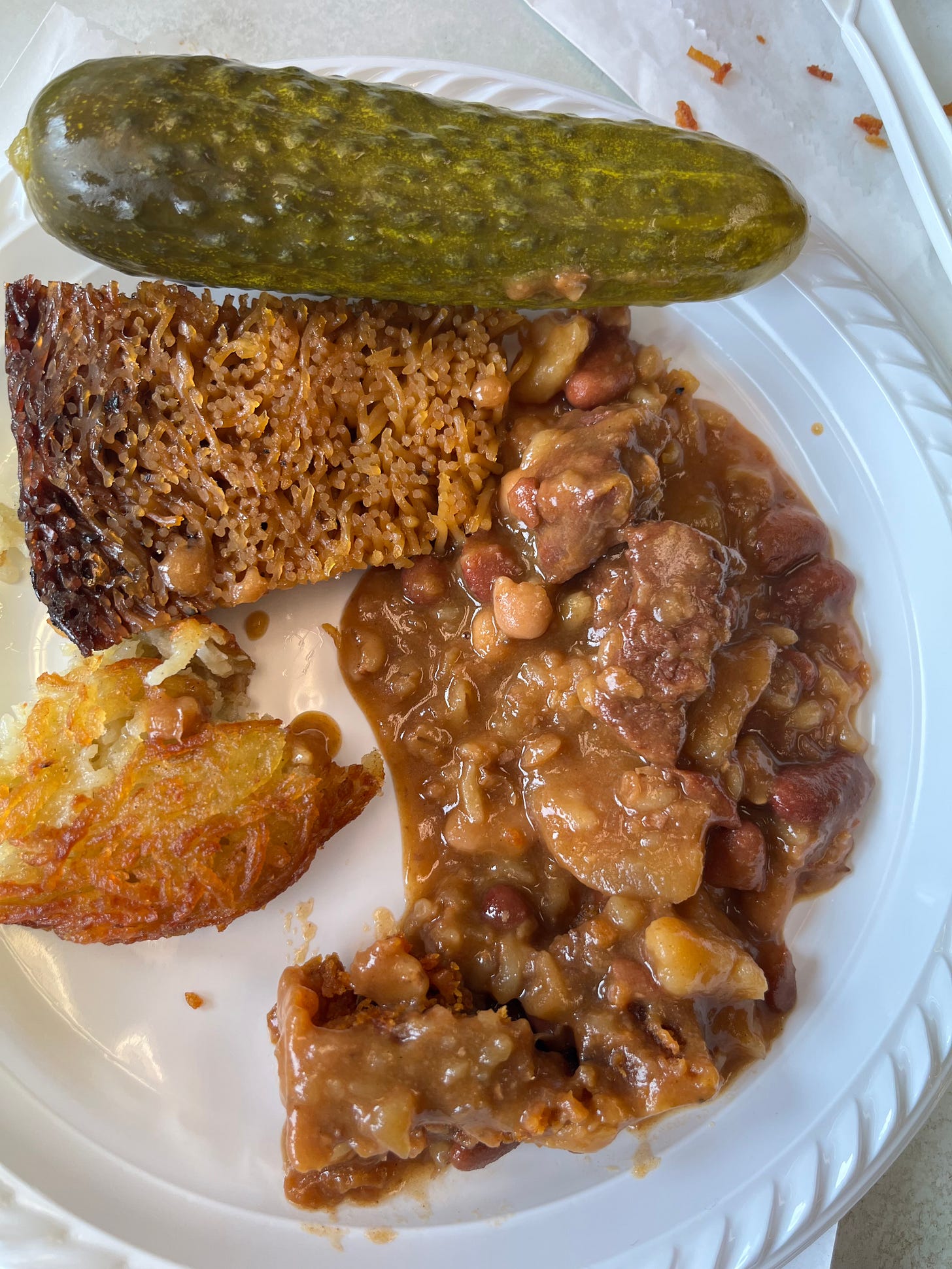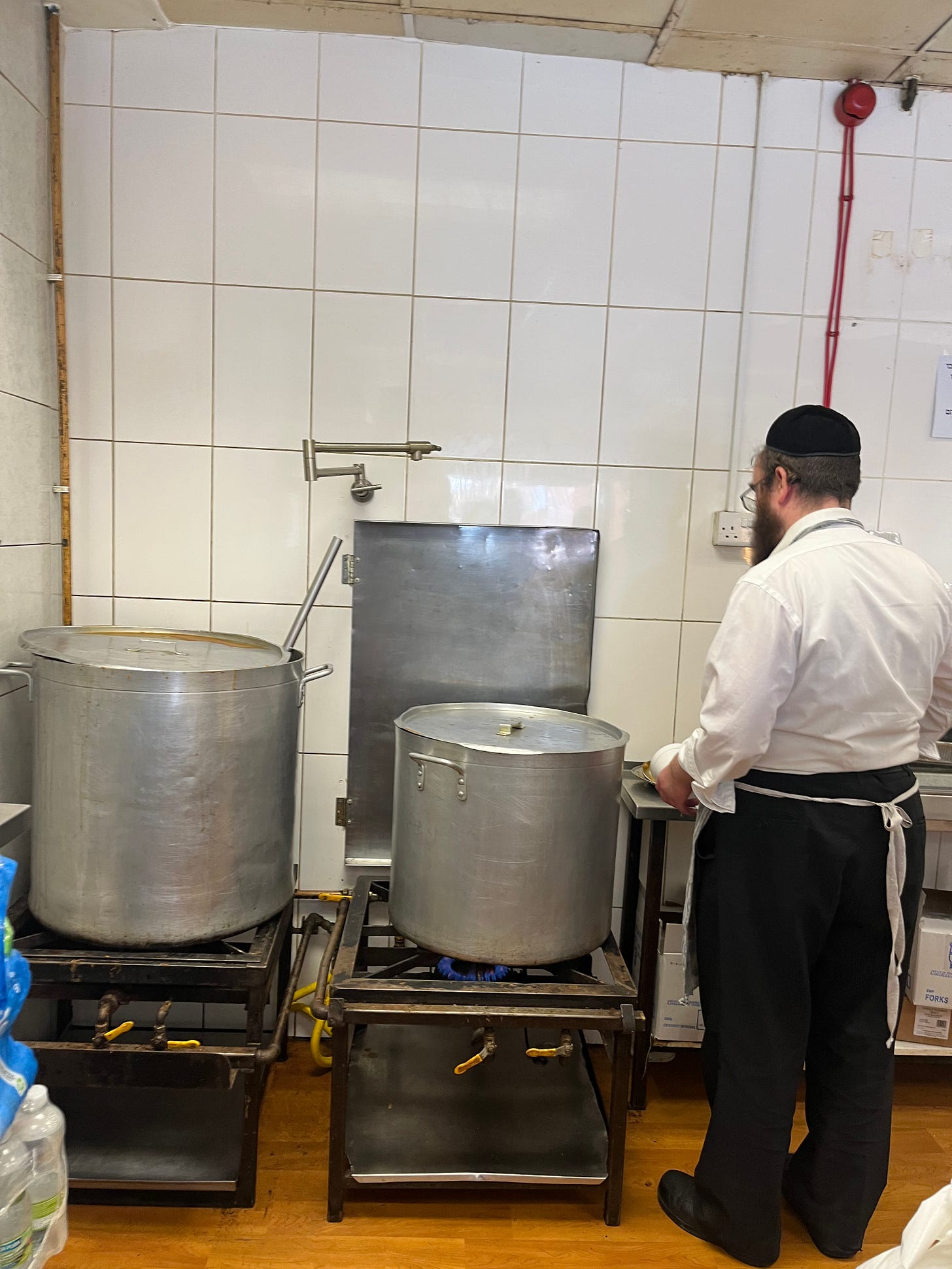A guide to Jewish food in Manchester
Words by Joel Hart, Ari Steinberger, Atar Hadari and Stewart Tray.
This article is a part of Vittles British Jewish Food Week. To read the rest of the essays and guides in the project, please subscribe below:
A guide to Jewish food in Manchester
From the country’s best cholent and kugel to amba coronation chicken
Manchester’s best Jewish food has always been found at Friday night dinners, Shabbat lunches and catered events – prepared by home cooks, both Ashkenazi and Sephardi. For many Jewish Mancunians, their food is either understood through what you eat in your own home and the homes of others, or through well-kept communal secrets. Most have heard of the Hyman family, who operated butchers and delis in the past, but now focus on producing very good smoked salmon at The Manchester Smokehouse. And most know Estelle Shiers, a cake producer who doesn’t exist on the internet, and yet whose sponge and multi-coloured icing combo has appeared at all major birthdays. My own tastebuds didn’t learn what Jewish food is by visiting the city’s kosher restaurants, but by eating Rochel Yaffe’s challah, Sara Senior’s tahdig, Rene Hodari’s kibbeh and my grandmother’s chicken soup.
As the city with the second highest population of Jews in the UK (30,000, after London with 145,000), which grew by 12 per cent between 2011 and 2021, the Jewish food scene has been expanding and shifting in intriguing ways. Manchester’s Jews are split between a growing but small ultra-orthodox community, who mainly reside in the North Manchester neighbourhoods of Prestwich and Broughton Park, areas that have seen growth in the number of kosher restaurants, and the rest, living in North Manchester locales like Whitefield, as well as Cheadle, Hale Barns, Hale and Bowden in the south (the Sephardic community of Didsbury has almost entirely relocated to these suburbs). They vary in religiosity, from secular and pork-eating to traditional high-holiday shul-goers who keep kashrut, and at the other end of the spectrum, those who are more devout and eat only in kosher restaurants, if they go out at all. The majority of the rest will eat out at non-kosher establishments, avoiding non-kosher meat, or at least pork and seafood, and are probably more used to eating at Italian and Syrian restaurants than anywhere serving kosher food.
Manchester’s Jewish food is defined by the integration of Ashkenazi, Sephardic, international and quintessentially British food options. This is obvious at most grocery shops, butchers and delis, where you’ll find fridges displaying pickled herring, chrain, babaganoush, hummus, sweet and sour duck sauce, lime pickle, English mustard and tahini side by side. The process may have begun in 1985, when The New Jewish Cuisine by Manchester-born and -based cook Evelyn Rose was published and found itself in Jewish homes across the city, forming the basis of the peculiarly eclectic options offered by caterers: canapes included mini burgers, lamb koftas and spring rolls. This was the first time many of Manchester’s Ashkenazi Jews were taught how to cook versions of dishes like shakshuka, where the meat strudel was reinvented with Sephardic spices, and where chopped herring with cherry brandy could be found next to ‘Persian’ lamb shoulder stuffed with spiced risotto rice, spreading an unruly idea of how expansive Jewish food could be. If Manchester’s Jewish food has a vernacular identity, it is the way this formula transpires – distinctly – among each of its creators.
While some of Manchester’s Jewish restaurants have gone brazenly mishmash, others have focused on more specific elements of Jewish culinary heritage. This guide focuses on the institutions making consistently good quality products over the years, as well as some newer places that are contributing to the evolution of Manchester’s Jewish food story. Joel Hart
Key:
AH - Atar Hadari
AS - Ari Steinberger
JH - Joel Hart
ST - Stewart Tray
Dovid’s Deli
31 Leicester Rd, Salford M7 4AS





